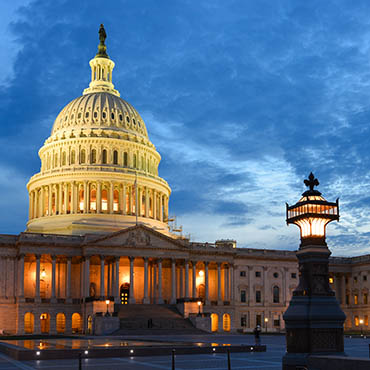Congress grants the National Labs a FITARA exemption in omnibus
The $1.1 trillion spending bill includes a FITARA carve-out for the National Labs, some key appropriations for IT improvements and cybersecurity, and lumps of coal for a few problematic programs.

The National Labs won a unique exemption from the Federal IT Acquisition Reform Act's CIO authority rules in in the omnibus appropriations bill that was released Dec. 16.
The proposed exemption for the Labs was a contentious issue throughout the FITARA implementation process.
In June, Sen. Lamar Alexander (R-Tenn.) told FCW that he worried that FITARA's rules might negatively impact efforts to procure and maintain the kinds of high performance computers used by nuclear researchers and others at the labs, including the Oak Ridge facility in Alexander's home state.
"One-size-fits-all models don’t work well, and I am concerned that this well-intentioned law could make it more difficult to develop the technology we need to support the Department of Energy's research and national security missions," Alexander said at the time.
The administration disagreed. "It's our viewpoint that FITARA is a tremendous management tool for the agencies, and we are not carving out the Department of Energy labs," Anne Rung, administrator of the Office of Federal Procurement Policy, told a House panel that same month.
In the end, however, Alexander and the Labs prevailed. Tucked away in the section of the omnibus that covers Energy and Water appropriations is legislative language declaring that "the provisions of 40 U.S.C. 11319 [FITARA] shall not apply to funds appropriated in this title to Federally Funded Research and Development Centers sponsored by the Department of Energy."
As a counterweight, a separate measure in the General Government section of the omnibus extends FITARA's CIO authorities and other provisions to independent agencies like the Federal Communications Commission and the Federal Trade Commission.
Other omnibus IT
Most of the items in the 2,009-page appropriations bill to fund the government for the remainder of fiscal year 2016 are top-line information, with few details on the nitty gritty of allocating dollars to specific projects. But, as is the case with the FITARA exemption, lawmakers use the appropriations process to crack down on problematic programs and departments, spotlight pet projects and highlight waste and scandal.
The 2016 omnibus takes aim at the issue of Hillary Clinton's private email server, which proved to be a thorny issue in the investigation of the Benghazi attacks. Under the omnibus, the State Department is now prohibited to pay for the support of external email servers and accounts operated outside the .gov domain.
The Office of Personnel Management is required to dedicate $21 million of its $272 million appropriation to IT security improvements, as a nod to continuing vulnerabilities in the wake of a breach of more than 22 million personnel records. Sympathetic lawmakers had sought a $36 million funding injection for OPM over the summer, but support for that measure never materialized. OPM is also instructed to consult with the U.S. Digital Service and the Department of Homeland Security on improving data protection.
Relatedly, the Office of the Director of National Intelligence is tasked with leading a probe into the OPM hack that includes input from DHS, the FBI, the Pentagon and other organizations. Congress is looking for an unclassified report that offers a look at incident response, damage from the incident, and metrics for quantifying harm to IT systems.
The Intelligence Community is also being asked to think about modernizing its satellite coverage. The omnibus calls for a report on improving spy satellite networks, with an eye to leveraging faster development cycles, commercial technology and commercial acquisition strategies.
The USDS, meanwhile, appears to have a future in government. The Information Technology Oversight and Reform operation, which is housed at the Office of Management and Budget and includes the federal CIO and the USDS, was funded at $30 million, and can transfer funds to other agencies. There's no word in the omnibus on the fate of more than $75 million in administration requests for agency-based digital services teams.
The spending bill shaves $1.7 billion off the Obama administration's IRS funding request, keeping base activity funding at the 2015 level of $10.9 billion while adding $290 million that can be used only for taxpayer services, fraud prevention and cybersecurity. The restrictions come after the Internet-enabled compromise of some 100,000 taxpayers' records, and the Government Accountability Office has raised repeated concerns about the IRS' management of its IT systems.
Lawmakers looked out for the Digital Accountability and Transparency Act. The Bureau of Fiscal Service at Treasury gets $19.8 million through fiscal year 2017 for activities related to implementation of the massive open government and financial management effort.
The Social Security Administration is allowed to reprogram unobligated funds from its $10.6 billion administration budget to go to IT modernization, including telecom infrastructure, software and more.
And lawmakers provided $233 million for improvements to the Vista health record at the Department of Veterans Affairs, and continue to urge improvements in interoperability with commercial electronic health record systems. If targets are not met, appropriators warned, funds will not be forthcoming.
FCW staff writer Zach Noble contributed to this article






